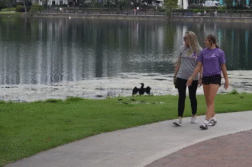CARMEL, Ind. (Ivanhoe Newswire) – Respiratory syncytial virus, or RSV, is a common illness among young kids. Eighty percent of babies catch it within their first year of life. For some, it can be serious and require hospitalization. Now, doctors are hoping new vaccines will help.
Eighteen-month-old Hannah and her twin brother Nolan are full of smiles and energy, but October 2022 was a different story.
“That was the worst week of my life,” their mother, Kym Lyell painfully remembers.
Both of her babies caught RSV at just seven months old. Hannah ended up in the hospital.
Kym expresses, “There were certain point in times where it was like, ‘Are we going to lose her?’”
Kym feared her daughter would end up on a ventilator. Instead, doctors used a special tool they call the “turtle shell” or “chest cuirass.”
“Instead of pushing air into your lungs, it actually draws the chest upwards with negative pressure. It creates a vacuum around the chest and it pulls the chest and then that brings air into the lungs,” explains Christopher Belcher, MD, Pediatric Infectious Disease Medical Director at Peyton Manning Children’s Hospital.
Hannah was in the hospital for a week before finally turning a corner. Dr. Belcher says RSV overwhelmed children’s hospitals in 2022. It hit earlier and worse than expected. This year, new vaccines could help, including one for babies entering their first RSV season.
Dr. Belcher further explains, “And this is not an active vaccine. These are premade antibodies. Just like mom transferring antibodies into the baby, this is an injection of antibodies that will hang around the baby for at least the five months that the season is expected to last.”
Kym’s message to others: take RSV seriously.
“You hear of this, of different sicknesses, and you never think it’s going to actually affect you,” she emphasizes.
Dr. Belcher says the new antibody is available for babies, but administration of it is still being worked out. There are also new, approved RSV vaccines available for people ages 60 and older, and for women in weeks 32 to 36 of their pregnancy. Dr. Belcher encourages people to talk to their health care providers about these new vaccines.
Contributors to this news report include: Lindsay Dailey, Producer; Kyle Fisher, Videographer; Roque Correa, Editor.
To receive a free weekly e-mail on medical breakthroughs from Ivanhoe, sign up at: http://www.ivanhoe.com/ftk
MEDICAL BREAKTHROUGHS
RESEARCH SUMMARY
TOPIC: RSV TREATMENT AND NEW VACCINES
REPORT: MB #5297
BACKGROUND: Respiratory syncytial virus, also known as RSV, is a respiratory illness that has similar symptoms to a common cold. This illness is most common in infants and adults over the age of 60. According to the National Foundation for Infectious Diseases, RSV is responsible for 58,000 to 80,000 hospitalizations and about 100 to 300 deaths in kids younger than five every year. In regards to adults, RSV is responsible for almost double that, with between 60,000 to 160,000 hospitalizations and 6,000 to 10,000 deaths a year. Individuals who are most at risk for the illness are premature babies, infants six months and younger, those with chronic heart or lung diseases and compromised immune systems, and older adults.
(Sources: https://www.cdc.gov/rsv/index.html
DIAGNOSING: Symptoms of RSV include: congestion, runny nose, fever, cough, and/or sore throat. More severe symptoms for infants include: difficulty breathing, not drinking enough, decreased activity, nasal flare, and bluish lips and fingernails. For adults, more severe symptoms include: flu-like symptoms, wheezing, pneumonia, and difficulty breathing.
NEW TECHNOLOGY: Peyton Manning Children’s Hospital is one of the first hospitals to use what is called the “turtle shell” to help babies with severe RSV symptoms. The “turtle shell,” which is a chest cuirass, “wraps around the patient’s chest and creates negative pressure to allow for easier breathing,” according to pediatric infectious disease medical director, Dr. Christopher Belcher. This is a key treatment for RSV.
Christopher Belcher, MD, Pediatric Infectious Disease Medical Director, Peyton Manning Children’s Hospital)
FOR MORE INFORMATION ON THIS REPORT, PLEASE CONTACT:
Brenna Ford
If this story or any other Ivanhoe story has impacted your life or prompted you or someone you know to seek or change treatments, please let us know by contacting Marjorie Bekaert Thomas at mthomas@ivanhoe.com




